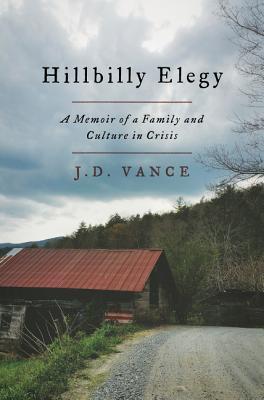The twenty-second book I read in 2018 was Hillbilly Elegy: A Memoir of a Family and Culture in Crisis by J. D. Vance. The book caused a big stir when it was published in 2016, and it's been on my radar for a while; but I only now got around to reading it.
Vance tells the story of his own dysfunctional family, which is not at all unusual in the memoir genre, but he also claims, as indicated by the subtitle, that, contra Anna Karenina, that his family was unhappy not in its own way but in a way that indicts the culture in which he grew up: in his case, diaspora Appalachians.
While media attention around the book has focused on Vance's "up by the bootstraps" ending, the vast majority of this book deals with the dysfunction which he has (so far) escaped. The meat of the story begins with his Mamaw and Papaw leaving Kentucky for a shot at a better life in Ohio. His grandparents' marriage was intensely dysfunctional itself during their childrearing years, but by the time J. D. came along, they had reconciled into the only safe haven he would know as a boy. His mother, herself traumatized by the violence of her childhood home, descended into addiction, serial monogamy, and worse, leaving J. D. and his older sister to depend on their grandparents and each other.
The first thing I must say about this book is that the language is vile. To the author, it may be unremarkable: he emphasizes that his family, especially his beloved Mamaw, was unusually vulgar, and he went from there into the Marines, where one expects that the language is hardly suitable for children. As a professional, however, Vance might realize that such language is inappropriate in some instances -- I doubt he uses it with a new client -- and in my opinion, the book is harmed by his choice to use it, not only in direct quotation but in his own narrative voice. While his story is moving and his analysis thought-provoking, the incessant obscenity prevents me from recommending the book to people I otherwise might. (See The Martian, which eventually got a bowdlerized classroom edition.)
The book aspires (I think) to be heart-warming and life-affirming, but some aspects of it leave me troubled rather than reassured about J. D. His affection for his grandparents is understandable but seems to lead him to condone actions that seem to me reprehensible. "Mamaw did it, and everything worked out," is not equivalent to "Mamaw acted wisely and in the best interests of the children involved." Many of the situations described in the book could just as easily have ended in tragedy as triumph and, in other families, have. In addition, I find his descriptions of the networking and connections that reaped him great rewards once he got to Yale Law to be revolting, verifying that it's not what you are capable of but who you know that weighs more heavily on the scales of success: once you are accepted into Yale Law (and learn which utensils to use in which order at a fancy restaurant), the rest of your professional life is set, which is nice unless you're not fortunate enough to be accepted into Yale Law.
Wednesday, June 6, 2018
Subscribe to:
Post Comments (Atom)
Blog Archive
Labels
- Agatha Christie (3)
- Alexander McCall Smith (23)
- apologia pro sua vita (49)
- Art Linkletter (29)
- Austeniana (10)
- bibliography (248)
- birthday (21)
- Charles Lenox (3)
- Christmas (29)
- deep thoughts by Jack Handy (16)
- Grantchester Mysteries (4)
- Halloween (10)
- high horse (55)
- Holly Homemaker (19)
- Hornblower (3)
- Inspector Alan Grant (6)
- Isabel Dalhousie (8)
- life-changing magic! (5)
- Lord Peter Wimsey (6)
- Maisie Dobbs (9)
- Mark Forsyth (2)
- Mother-Daughter Book Club (9)
- No. 1 Ladies' Detective Agency (14)
- photo opportunity (103)
- pop goes the culture (73)
- rampant silliness (17)
- refrigerator door (11)
- Rosemary Sutcliff (9)
- something borrowed (73)
- the grandeur that was (11)
- where the time goes (70)

No comments:
Post a Comment